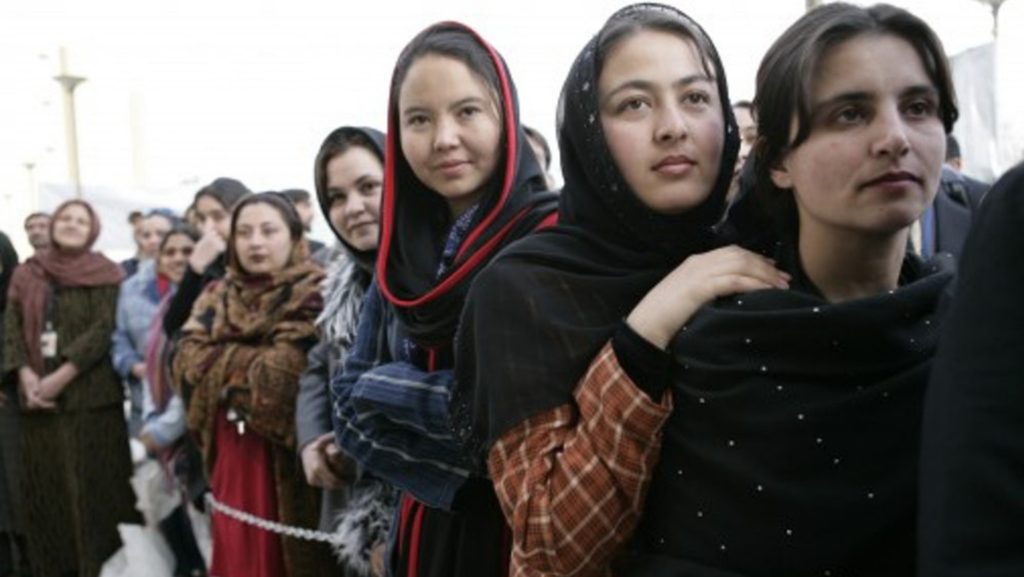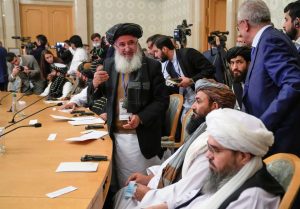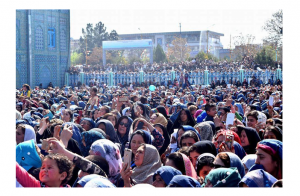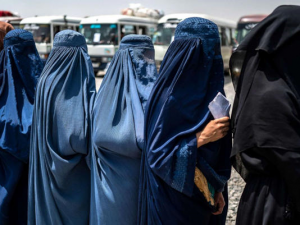History teaches that wars and revolutions bring big, mostly irreversible changes to peoples’ lives and attitudes. This historical fact has nowhere been truer than in Afghanistan since the collapse of the monarchy in 1973. A remote and sleepy country, with a population of fifteen million and an illiteracy rate of 80-90 percent, seemed peaceful and undisturbed thanks to its status as a buffer state, agreed upon by the two empires of the nineteenth century, i.e. Great Britain and the Czarist Russia. Following the Second World War, the new superpowers, the United Sates and the Soviet Union appeared to value the buffer-state status of Afghanistan and avoided direct confrontation or interference in the country. The Afghan state, compelled to slowly modernize the country, relied on both superpowers for technical and financial assistance.
The intention of the two superpowers to maintain the status quo in Afghanistan made the task of governing the country easy for its leaders. To govern the country peacefully, the only thing the Afghan leaders needed to do was 1) to cautiously maintain friendly and balanced relations with both superpowers of the Cold War era, and 2) to make sure that the local tribal leaders (Khans, Maliks, and Mullahs) kept their loyalty to the regime. The buffer-state status of Afghanistan, and the interests of its ruling class, insulated the country’s people and their leaders against the Tsunami of change that was happening in the rest of the world. Thus, millions of Afghans, except a few in the capital city of Kabul, remained subservient and undemanding, never gaining relevance to the task of ruling the country. Millions of disenfranchised and abjectly poor Afghans could easily be managed through indirect rule and the threat of potential use of force.
The coup of 1973, launched by Sardar Mohammad Daud, a cousin of the King, in collaboration with low-ranking officers of the army, led to the establishment of what came to be known as Daud’s Republic, now known as the First Afghan Republic. Although a true republic, risen from the peoples’ vote, was never established, the change in regime caused drastic political and psychological change in the minds of the people of Afghanistan. Politically, the sudden and easy collapse of the monarchy, along with the fact that most of the army officers who toppled the regime came from remote, severely underdeveloped agrarian communities, broke the talisman of a stable, invincible political regime, led by a few privileged individuals connected and loyal to the monarchy. Psychologically, the regime change, along with the former King’s democratic experiment of 1963-1973, awakened the people of Afghanistan to the fact they can and should have a voice in the governance of their country.
Ever since 1973, Afghanistan has been in turmoil while struggling with the consequences of the regime change that happened almost 50 years. This change released the pint-up forces of dissatisfaction that had accumulated during the period of Afghanistan’s isolation and its era of chimeric peace. The change also opened the door for the people of Afghanistan to see what was happening in the outside world. And finally, the change paved the way for foreign powers to seek opportunities to interfere in the country. The era of buffer-state position of Afghanistan was coming to an end.
For today’s putative leaders of Afghanistan, the long-lasting consequences of these changes have proven extremely difficult to manage. These three changes have deprived the country of the benefit of a capable, sophisticated, and sound leadership with a national base and broad mandate. During the last 50 years, Afghanistan has not been able to produce a nationally recognized and internationally trusted leadership. The pint-up forces of domestic dissatisfaction organized along tribal-racial-religious interests, together with foreign clientele support of these interests, have forced those who aspire to the task of leadership to cater to the whims and wishes of a few who support them at the cost of ignoring the interests of the rest of the nation. Dependency on foreign support has become a key requirement of leadership in Afghanistan. This, in turn, has paved the way for ever-lasting proxy wars detrimental to national unity, peace, and reconciliation.
What is more devastating in the case of leadership in Afghanistan is the fact that those who call themselves leaders have failed to learn the intricate art of leadership in a society that is diverse and has experienced openness and independence of mind. Today’s Afghan leaders have failed to learn how to lead a people whose minds have awakened, a people who have learned how to choose and judge their leaders. The Afghan so-called leaders, so far, have not gained the capability to work with a diverse society that eagerly aspires to be heard and be the focus of leadership decision-making. Most of those who call themselves leaders in today’s Afghanistan are wedded with sterile authoritarian principles and the outdated way of indirect rule. They depend on their own ideas and hunches and cater to the interests of their own clientele while neglecting the aspirations of the larger society, as well as the expectations of the world. They forget that in a society that has gone through 50 years of dramatic political, social, and psychological change, depending on one’s own ideas and those of one’s own beneficiaries is a recipe for lasting conflict. They forget that surviving on foreign support makes the country an arena of proxy wars. They also forget that countries and nations are mainly built by their own people and resources, not by foreigners or their resources.
It is deeply saddening that after five decades of socio-political experimentation, the leadership class in Afghanistan still remains childish and immature, mostly devoid of the necessary skills to help the country live in peace. Apparently, our Post-Cold War leadership has learned nothing from history.




